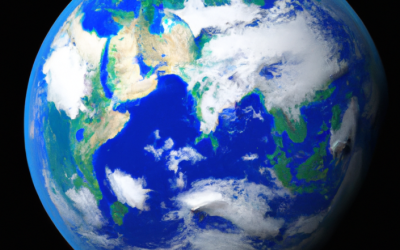Scope & Purpose of the Document
The phrase Global Warming (GW) is now popularly used to refer to the warming of the earth’s surface (land-ocean combined) in recent years due to increasing concentration of greenhouse gases (GHG) in the atmosphere as a result of world-wide human activity and industrialization. Of the three GHG (carbon dioxide, methane and nitrous oxide), carbon dioxide is considered to be the most important since its concentration in the atmosphere has steadily increased in last fifty years due to world-wide use of fossil fuels. The earth’s mean temperature has increased by about 0.6C in the last one hundred years and most state-of-the-art General Circulation Models (GCM) of the atmosphere-ocean system suggest that the earth’s mean temperature may increase further by 30C (or higher) by 2100 and this temperature increase may trigger catastrophic events (ex. floods, droughts, sea-level rise, Greenland and Antarctic ice sheets melt-down etc) endangering human societies world-wide.
The Intergovernmental Panel on Climate Change (IPCC), a UN Body of scientists (primarily working with various nations’ meteorological & environmental Agencies) was established in 1988 and has been assessing the state of world climate through the publication of periodic reports. A UN Framework Convention on Climate Change (UNFCCC) was established in 1992 and in a meeting held in Kyoto (Japan) in December 1997, it was agreed by all participating countries to reduce GHG emissions to the 1990 level and to help stabilize the earth’s climate. The first phase of the Kyoto Agreement came into force in February 2005 and all participating nations of the industrialized world agreed to reduce their GHG emissions by 2012. The developing nations like India, China, Brazil etc, which are exempt from the Kyoto Agreement at this point in time, will be encouraged to come on board after 2012, so as to develop a world-wide strategy to ‘combat’ GW and associated climate change. The UNFCC has been holding annual meetings to review the progress of GHG emission targets and urging some of the industrialized countries notably the USA and Australia ( which are not yet part of the Kyoto Agreement) to join the Kyoto Agreement.
As the debate on climate change and GHG emission targets continues unabated, a large number of studies questioning the GW science have appeared in peer-reviewed International scientific Journals. These studies have seriously questioned many aspects of the GW science and at present there is an emerging view among many scientists that the present climate change may be more due to natural variability rather than due to human-added CO2. The impact of solar variability and changes in large-scale atmospheric circulation patterns are now considered as providing significant impact on the earth’s climate in historical as well as in geological times.
This Document presents an annotated bibliography of selected peer-reviewed papers which question the current state of the GW science. Seven major areas of the GW science are identified and in each of these seven areas present understanding is briefly reviewed followed by a list of key papers questioning the present assessment. A category entitled Miscellaneous lists several papers which question one or more aspects of the GW science and also includes other papers which are not covered elsewhere. The following is the list of various areas and categories:
1. Temperature reconstruction using proxy data; the Hockey Stick Graph
2. Impact of solar variability on the earth’s climate
3. Sea-level rise, ocean surface warming/cooling etc.
4. Arctic and Antarctic temperatures: from Holocene to present
5. Impact of large-scale circulation patterns
6. Extraneous influence on mean temperature trends: urbanization, land-use change etc.
7. Uncertainties in climate model simulations
8. Miscellaneous studies


